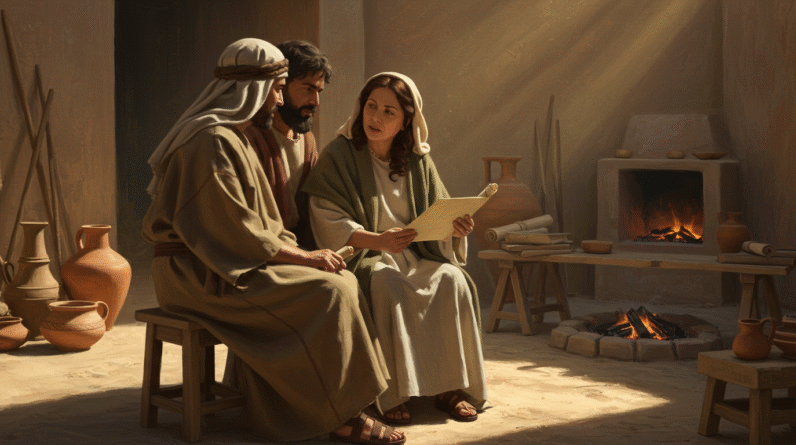Discover how the New Testament highlights the profound impact of faithful women like Priscilla, offering timeless lessons on faith, ministry, and equality.
The Legacy of Faithful Women: Lessons from New Testament Ministry
Introduction
Hey there! If you’ve ever wondered about the impact women had on the early Christian church, you’re in for a heartfelt exploration. Today, we’re diving into the New Testament, a time when powerful narratives were unfolding, and among them were those of incredibly faithful women. These women didn’t just stand in the background. Oh no, they were front and center in spreading the Gospel and supporting the early church in a world still grappling with gender norms. Their stories are not just ancient tales; they’re relevant and inspiring for today’s believers.
The New Testament sings praises not only to this idea of faith but also illustrates how women exemplified it fiercely. Whether hosting in their homes, teaching or giving financial and emotional support, these women were trailblazers. Their ministries planted seeds of faith that would blossom across generations. And isn’t that something we’re all striving for – to make a difference that lasts?
So, why should their stories matter now? Because they remind us that anyone, everyone, has a role in this community of faith, regardless of gender. Let’s dig in and see the lights these women shone, which still illuminate paths today.
Historical and Biblical Context
So, what was it like for women in the 1st-century church? Picture this: Society had quite a few cultural and religious curtains that women couldn’t see behind. Despite this, God had different plans. These women weren’t just witnesses to the ministry; they were actively ministering, even when societal boundaries said otherwise.
At that time, women’s roles were largely defined by domestic responsibilities. However, Christ’s transformative message heralded a new understanding of equality, and women found themselves at the heart of the ministry movement. Consider Galatians 3:28, which says, “There is neither Jew nor Gentile, neither slave nor free, nor is there male and female, for you are all one in Christ Jesus.”
This radical inclusion meant that women had essential parts to play. They were participating by providing safe havens for new believers and even being strong financial supporters of the growing church. Truly, God’s view on women in ministry was one of empowerment, seeing them as integral to His unfolding story of redemption.
Profile of a Faithful Woman in Ministry: Priscilla
A. Name and Identity
Meet Priscilla, a name that rings with vibrancy and action. You’ll find her alongside her husband, Aquila, scattered through the pages of Acts and Paul’s letters. Priscilla, a Roman woman, had an influential voice in an era that often silenced women’s voices. She stood out not only for her marriage partnership but also for the theological discussions she had with church leaders. Her name surfaces in moments when the gospel’s reach was escalating, showing her frontline commitment in fostering Christian faith.
B. Ministry and Contribution
Priscilla wasn’t one to merely occupy a passive role. She was actively engaging in the teaching and theological instruction of others. Her partnership with Aquila made them a dynamic duo, and together they hosted and taught in their home. In Acts 18:24-26, she and her husband take the eloquent Apollos aside to explain “the way of God more adequately.” This couple cared about the precision of doctrine, showing their dedication to nurturing sturdy believers.
She and Aquila were tentmakers, just like Paul, but more importantly, they were disciples and disciple-makers, echoing a missionary spirit that saw the home as a springboard for the gospel. Through hosting gatherings, Priscilla played a crucial role in strengthening and expanding the early church community.
C. Lessons from Her Life
Priscilla’s steadfast commitment to hospitality and teaching teaches us that leadership often begins in familiar, everyday spaces. Modern believers can draw from her example, understanding that ministry doesn’t always need a grand title. It thrives in small, dedicated actions. Priscilla’s unwavering partnership in ministry shows how collaboration, regardless of gender, pushes the boundaries of what’s possible when faith leads the charge.
Her story champions the themes of faithfulness, equality in partnership, and bold teaching. Whether consciously asking more questions in Bible studies or choosing to mentor budding believers, her legacy encourages active participation.

Impact on the Early Church
Priscilla’s influence reaches far beyond her direct interactions. She, along with her husband, was integral to the growth of the early church in cities where they traveled. Her relationship with Paul and mentoring Apollos solidified the growth and grounding of church leaders in sound teaching.
Her life encourages a model of church leadership concurrent with the early apostles, indicating a form of spiritual egalitarianism. Churches sprouted where Priscilla worked, which wasn’t merely due to the architecture of buildings they inhabited, but from the foundations of relationships she established.
Historically, Priscilla’s continued legacy through traditions showcases ongoing respect and importance attributed to her. It’s said that her story of faith and ministry crossed generations, with many recounting her striking contributions.
Application for Today
Now let’s bring these stories into today. How can Priscilla’s dedication encourage women in modern ministry? For starters, it’s about seeing every situation, however domestic or wide-reaching, as an opportunity for spreading goodness. Churches should take note of these stories to actively open up avenues for women’s leadership. This includes celebrating women who teach, host groups or serve community needs every week.
Believers can replicate her legacy by:
- Opening their homes for gatherings or study groups.
- Taking charge in faith discussions, whether in churches or casual settings.
- Pursuing partnership modes in ministries where collaboration thrives.
In doing so, churches become not just institutions but vibrant communities of learning and encouragement.
Conclusion
Priscilla’s life offers us a tapestry woven with themes of dedication, teaching, and mutual respect in partnership. Her life reminds us that ministry is often a family affair, spanning beyond bloodlines into the broader kinship of community faith. Her story gives hope, persuading us to step into roles of encouragement, teaching, and leadership, no matter how society grapples with structures.
In closing, let’s take a page out of Priscilla’s book and consider Romans 12:6-8: “We have different gifts, according to the grace given to each of us.” Whether your gift is in teaching, hospitality, or leadership, let it shine. Go out, and let your story of faith be your legacy.
Acknowledgment: All Bible verses referenced in this article were accessed via Bible Gateway (or Bible Hub).







